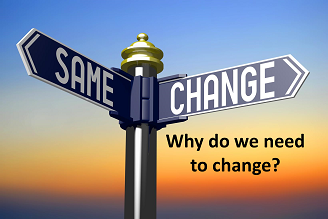Recently I presented a webinar along side Tom Lynam where we discussed digital transformation and some of the systemic challenges currently faced by organisations. While I got some early feedback that this topic already had a lot of content available, I wanted to write this post to share some of the key items we discussed showing the specific relevance to Canberra and Commonwealth Government. I’m also keen to hear more from you on your thoughts and feedback.
I won’t be able to cover everything we discussed in the session, but I will give you a bit of a summary of the main topics covered in the webinar.
So here goes:
The public sector is not immune from the need to change.
In the first part of the webinar we discussed why organisations (and the APS in particular) need to change. Historically the public sector has been perceived to be largely immune to changes impacting the private sector, but is this really the case? As technology improves and the use of tools such as automation and AI become more mainstream this will not only impact the way the public sector works and the roles which make up the APS, but it will also provide new opportunities for private organisations to further privatise the work traditionally fulfilled by the public sector. One thing often forgotten in the discussion about how to be successful in digital transformation efforts is “why we are transforming in the first place”. This is an extremely important conversation that has to happen at all levels so that staff within the APS know why and how digital transformation is taking place, and how they can be a positive part of the change. Change doesn’t necessitate a negative impact, indeed it can and will open up new opportunities.
Digital transformation is hard because it’s not about technology.
One of the biggest takeaways from the session was that one of the main reasons that organisations struggle with digital transformation is because it’s not actually about technology, but about changing the culture of an organisation. Digital transformation is more about the transformation, and less about the digital. Challenges arise both because not all organisations realise that point, and by the nature of cultural change itself being extremely difficult. Many digital transformation initiatives fail because they focus only on delivering a new digital service (singular) or bringing an internal process (singular) online. Yes, these are typically part of a digital transformation initiative, but unless an organisation fundamentally looks at changing it’s culture to better respond to an ever changing environment, deliver value quicker, challenge it’s own status quo and ensure that the whole organisation is supporting that effort, it will struggle to successfully transform
Best practice still applies.
Knee-jerk reactions in support of digital transformation can undo years of internally developed good and better practices. Now while an organisation must constantly challenge itself to improve, this does not mean throwing the baby out with the bath water in a change of approach. Something I have heard with alarming frequency is of organisations removing project and program manager roles and replacing them with Scrum Masters or some other non strategic role. Both are very important in their respective fields, but one is not a replacement of the other, you should have both! It is more important than ever for organisations wanting to undertake transformational activities to leverage best practice in project and particularly program managementIt. This is especially true in the public sector context, where strong governance (that is, strong decision making capability, not excessive control) is in place to ensure senior executives have the right information, at the right time, so they can successfully fulfil their role within a transformation. The creation of isolated agile delivery teams unsupported by wider organisational arrangements is a common response which has frequently led to major issues, indeed sometimes reinforcing the silos that mature agile and project management approaches work so hard to overcome.
There is so much more to say, but I hope this post has provided some things for you to consider in your transformational efforts.
I would also be delighted to hear your thoughts on what we discussed. Do these points resonate with you? Are you currently facing challenges around digital transformation? Are you looking forward to being part of future transformation initiatives?






Leave A Comment